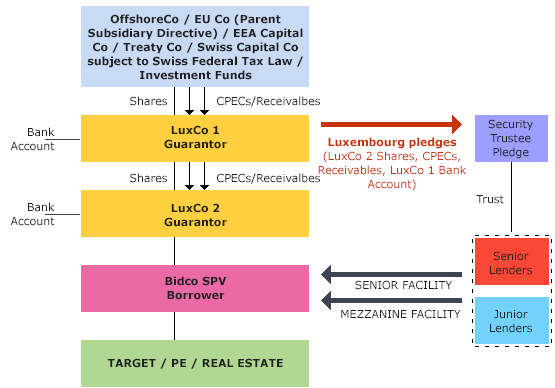The challenge: Securing and unsecured environment
For the first time in 2009, Luxembourg financial collaterals were subject to enforcement. That enforcement was a very première, quickly followed by further similar cases. Those enforcement exercises proved to be outstanding live stress tests to check the efficiency of the Luxembourg security packages.
Such stress tests were successfully passed and more than confirmed the inherent strengths of the Luxembourg legislation on financial collaterals arrangements. As a result, Luxembourg is the lenders’ hub of choice for the implementation of structured finance security packages.
The two-tier Luxembourg Package
The Luxembourg two-tier structure is being regarded as one of the strongest security package structures available.
In a nutshell, LuxCo1, in its capacity as guarantor of the facilities lent by the Lenders (Senior, Junior. Mezzanine) to Bidco SPV, grants the Security Trustee financial collaterals over 100% of its assets.
The pillars of the law on Financial Collateral Arrangements
From the outset, Luxembourg regarded the EU Directive 2002/47 EC on financial collateral agreements as a unique opportunity to implement into its national legislation a legal instrument fully protective of the interests of the lenders, in particular upon enforcement.
The law of 5 August 2005 on financial collaterals (the “Law on Financial Collateral Arrangements”) has embodied such mechanisms in a comprehensive manner placing Luxembourg financial collaterals in a leading position.
The pillars of the Law on Financial Collateral Arrangements may be summarized as follows:
- Non-formalistic implementation of the Luxembourg financial collaterals;
- Emphasis put on contractual freedom;
- Full protection against pre-insolvency and insolvency risks on the part of the pledgor; and
- Unparalleled efficiency of the enforcement mechanisms
The above features have been reinforced by a law of 20 May 2011 amending the Law on Financial Collateral Arrangements.
Non formalistic implementation of the security package
With respect of assets such as financial instruments, receivables, bank accounts, the Law on Financial Collateral Arrangements sets up an informal process of implementation/dispossession of the pledged assets, by means of registration (registered financial instruments), notice to the issuer (shares, equity instruments), the third party debtor (receivables) or to the depositary (bank).
All formalities of implementation/dispossession of the pledges may be privately conducted and do not require any intervention of public authorities (courts) or officers (notaries, baillifs, etc.), therefore providing a cost, time-wise and confidentiality positive effect.
Tailor-made security package
Contractual freedom predominantly inspires the Law on Financial Collateral Arrangements. The purpose is to make available to the parties a tailor-made security package. In this respect, parties are allowed to:
- Set-up multi-ranking pledges;
- freely allocate to the pledgor or the pledgee voting rights/dividends/use of the pledged assets before and after default has arisen under the facilities; and
- waive any rights of subrogation or recourse.
Bankruptcy Remoteness
One of the major concerns of the Luxembourg legislator while enacting the Law on Financial Collateral Arrangements was to prevent any risk related to insolvency or pre-insolvency which may affect the pledgor and may further jeopardize the rights of the lenders.
In particular, the Law on Financial Collateral Arrangements expressly excludes the detrimental effects of the claw-back period: financial collateral arrangements, as well as the facts triggering the enforcement thereof, are valid and enforceable vis-à-vis third parties, bankruptcy trustees, receivers, liquidators or other similar agents, notwithstanding any Luxembourg or foreign pre-insolvency or insolvency measures, as well as in respect of civil or criminal attachments. The standard “zero-hour” principle is therefore excluded, bankruptcy remoteness being extended to all pledges concluded until and including the date of the opening of the pre-insolvency or insolvency measures.
Quite noticeably, the Luxembourg case-law interpretation has strongly confirmed the full remoteness effect of the Law on Financial Collateral Arrangements:
The Luxembourg judicial interpretation trend is crystal clear: Luxembourg courts are eager to give full protection to lenders to the extent permitted by law. The recent judgment rendered by the district court of Luxembourg on 16 November 2012 strongly reaffirms this trend. In the case at hand, the court dismissed the bankruptcy trustee’s claim for annulment of the collaterals’ enforcement proceedings and, in respect of the damages’ claim raised by the bankruptcy trustee, stayed its proceeding until such time as pending foreign proceedings have decided (EU related actions’ exception). By holding so, the district court of Luxembourg evidenced the notable legal issues raised by the intricate multiple sets of proceedings which may be at the core of cross-border structured finance’s judicial resolution.
(D. Boone, Face aux falaises de marbre de la loi sur les garanties financières (TA Luxembourg, 16 novembre 2012), JurisNews Sociétés, Luxembourg, Vol. 5, n° 9/2012, pp. 204-207)
Straightforward and efficient enforcement measures
The main features of enforcement of the security package may be summarized as follows:
Breach of any contractual obligation allows enforcement
Enforcement is no longer subject to acceleration of the underlying debt
Wide range of enforcement measures available
- Private appropriation of the assets by the pledgee or a third party, at the price determined, before or after the appropriation, in accordance with the valuation method agreed between the parties
- Private sale
- Sale in a stock exchange or by way of public auction
- Appropriation by court order
- Set-off
Enforcement is straightforward
- Enforcement is not subject to prior notice to the debtor
- Enforcement may be fully privately conducted (in case of private appropriation or private sale)

